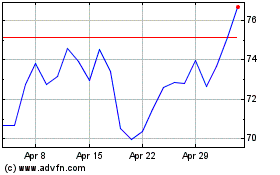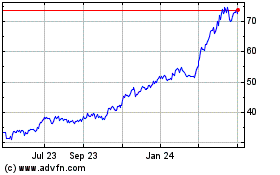Low Electricity Prices Dim Power Plant Operator Profits
November 04 2016 - 11:47AM
Dow Jones News
By Cassandra Sweet
Low electricity prices are making it less profitable to be a
power plant operator.
Companies that sell electricity to utilities, such as Dynegy
Corp., Calpine Corp and NRG Energy Inc., reported slim profits or
losses in the third quarter compared to the same period a year ago,
as they continue to be battered by wholesale power prices that have
fallen in recent years along with prices for natural gas.
Average wholesale electricity prices have dropped 15% this year
to $29.70 a megawatt-hour, according to a Wall Street Journal
analysis of power market data from the Energy Department. That is
43% below the 2014 average.
On Friday, NRG reported a quarterly profit of $393 million,
compared to $67 million a year earlier. After adjusting for a $266
million increase from asset sales and other one-time items, net
income declined $203 million, due to lower energy margins and costs
related to paying down debt. Revenue was $3.95 billion, down from
$4.43 billion a year earlier.
"Our generation business performed well during some very
challenging market conditions," NRG Chief Executive Mauricio
Gutierrez said during a conference call Friday with analysts.
NRG's shares traded up 10% higher Friday morning at about $11.10
after its results beat analysts' expectations, but are down 5%
year-to-date.
Dynegy on Tuesday posted a quarterly loss of $249 million, on
$1.18 billion of revenue, compared to a $24 million loss on $1.23
billion in revenue a year earlier. Calpine last week reported net
income of $295 million, up 8% from the previous year, on revenue of
$2.36 billion, but its profit for the first nine months of the year
net was just $68 million, down 76% from the previous year.
"It's an adverse environment because of the low gas prices, and
it's aggravated by the growth of renewables," said Hugh Wynne, an
analyst at investment research firm SSR LLC in Stamford, Conn.
Dynegy, which owns about three dozen coal and natural gas-fueled
plants across the U.S., aims to navigate the low prices by buying
plants and streamlining operations. It is also ramping up lobbying
efforts with state and federal regulators, and lawsuits, to
preserve competition in the power markets, Chief Executive Bob
Flexon said.
Those efforts include opposing a plan New York officials
approved last August to provide subsidies to money-losing nuclear
power plants to keep them operating.
"You've undermined wholesale price formation because out-of-the
money assets are given billions of dollars to stick around," he
said of the subsidies. Shares of the Houston-based company have
dropped 38% year to date, to about $8.39 on Friday.
Exelon Corp. has been faring better than some rivals since it
also owns regulated utilities. They have more stable profits,
because utilities can pass on their costs to their customers in the
form of higher rates and can usually rely on a guaranteed rate of
return on their investments. Shares of Exelon were trading Friday
at about $32.83, up about 18% this year.
But while the company last week posted a higher third-quarter
profit overall, its ExGen commercial power generation unit reported
net income of $236 million, 37% less than a year earlier.
"We're not happy with the outlook that we see at ExGen," Exelon
Chief Executive Christopher Crane said last week during a
conference call with analysts.
Power plant owners that don't own utilities, such as Dynegy and
Calpine Corp., have had a tougher time.
Calpine, which owns several dozen gas-fired power plants, peaker
plants and geothermal power generators, narrowed its full-year
guidance range for adjusted earnings before interest, taxes and
other items to between $1.8 billion and $1.85 billion, from $1.8
billion to $1.95 billion. Calpine's shares are down about 21% year
to date, at about $11.43 Friday.
"The wholesale power markets have disappointed in 2016," Calpine
Chief Executive Thad Hill said during a conference call with
analysts last week. He added that he expects wholesale prices will
begin to rise as early as next year in some areas, as more
companies shut unprofitable power plants and electricity supplies
get tighter. "There is a reason to believe in recovery."
Write to Cassandra Sweet at cassandra.sweet@wsj.com
(END) Dow Jones Newswires
November 04, 2016 11:32 ET (15:32 GMT)
Copyright (c) 2016 Dow Jones & Company, Inc.
NRG Energy (NYSE:NRG)
Historical Stock Chart
From Aug 2024 to Sep 2024

NRG Energy (NYSE:NRG)
Historical Stock Chart
From Sep 2023 to Sep 2024
